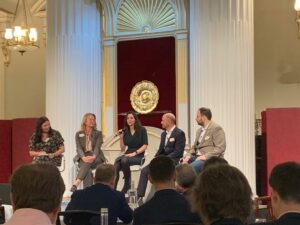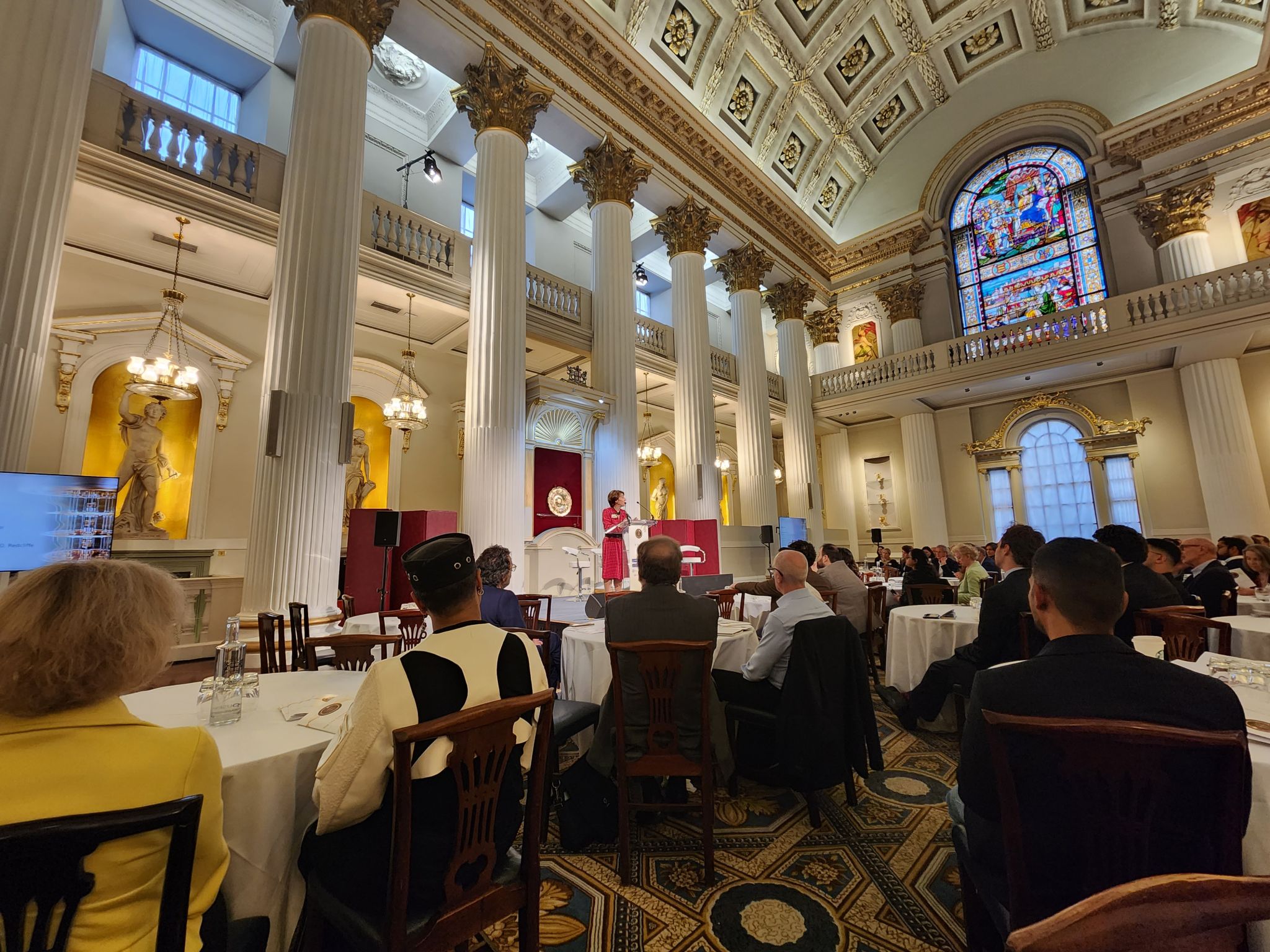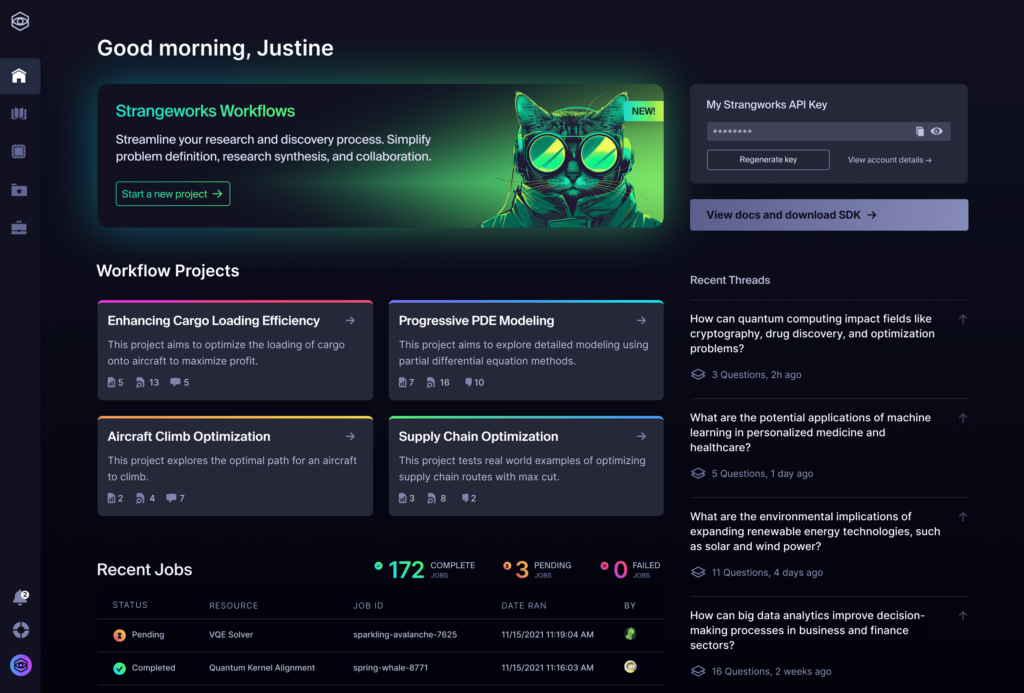Insider Brief
- The City Quantum Summit 2023 was held this month at London’s Mansion House.
- Convergence — quantum’s ability to cross disciplines and technologies — was an emerging theme.
- The event was founded by Karina Robinson, CEO of Redcliffe Advisory and Multiverse Computing senior adviser.
This year’s City Quantum Summit, held in London’s Mansion House, brought together experts and enthusiasts from around the world and across various disciplines and occupations.
It wasn’t the only sign of convergence, said Karina Robinson, CEO of Redcliffe Advisory, founder of The City Quantum Summit and senior adviser to Multiverse Computing.
Quantum’s computational power means it is destined to merge with other forms of technology, including artificial intelligence, one of the most hotly debated topics in tech today.
Robinson, who offered introductory remarks, encouraged the 350 people who attended the Summit, to consider the natural connection between AI and quantum.

“As an industry, we need to tie ourselves to the AI explosion,” said Robinson. “Without quantum, AI is going to use up vast amounts of computing power, while the data sets are too messy, and too big. Any nation that falls behind in quantum, falls behind in AI – we need to make that point. There isn’t enough awareness in investment, AI and government circles.”
Quantum AI Future Directions
A panel on Quantum AI echoed Robinson’s plea to raise awareness of the need for merging quantum tech and AI.
Román Orús, co-founder and Chief Scientific Officer, Multiverse Computing, said that quantum AI could present new paths forward for AI and, in fact, may be the only current solution to scaling AI and machine learning in feasible ways.
 “The problem with AI is the cost – not just in energy and in money and every cost that you can imagine – is growing hyper-exponentially,” said Orús. “We have to bring these costs down, to make it more efficient, to compress it and the only way to do that is through quantum and quantum-inspired methods.”
“The problem with AI is the cost – not just in energy and in money and every cost that you can imagine – is growing hyper-exponentially,” said Orús. “We have to bring these costs down, to make it more efficient, to compress it and the only way to do that is through quantum and quantum-inspired methods.”
Orús said that quantum approaches may not be a solution – but THE solution.
“Quantum is not an alternative – it’s the only solution,” said Orús. As a result, Multiverse is launching a new product, called “CompactifAI”, which uses quantum-inspired techniques to compress large AI models and make them more manageable and efficient by a factor of 50% or more.
“We expect CompactifAI to be a game-changer in the AI industry,” he said.
Denise Rufner, president, Diversity in Quantum, said that, based on visits to customers, there is an increasing interest in quantum AI that matches the growing number of use cases – from building systems that detect incoming missiles to designing ships that are faster and more environmentally friendly. Startups are exploring the use of quantum AI to find ways to improve the environment, she said. Quantum AI may one day be a useful tool for companies and organizations seeking climate change solutions.
“There’s a lot of quantum work being done for climate,” said Rufner. “ But, quantum computers are still in their infancy and I think they need to grow before they are able to make an impact. There are a number of startups that are working on climate.”
Scott Faris, CEO of Infleqtion, sees a natural progression in incorporating AI into their business. The connections between the problem-solving power of AI and the computational potential of quantum seems almost organic for the company.
“We see a lot of synergies between our hardware and software,” said Faris. “A good example is that the software company we acquired does a lot of work in control error – this is manipulating the atom to get what we want them to do. A lot of the techniques associated with doing that are actually based on machine learning. We’ve taken a lot of those techniques and turned them into products and brought them into other programs we’re working on.”
This organic coupling of quantum AI could lead to developments in life sciences, national defense, data science and finance, to mention a few, said Faris.
Quantum as Climate Catalyst
The City Quantum Summit aimed to bring together people from around the world and from across educational and experience levels to talk about quantum and how to ethically tap this technology for good.
The summit included several panels focused on what quantum experts term as “use cases” – or practical applications that suit quantum computing. One panel focused on climate, with many experts speculating it as a perfect problem for the unique computational potential of quantum technologies and the merging of quantum with current technologies. Creating solutions for global climate change will require precise measuring and complex modeling – and quantum sensing and quantum computing could serve as tools to tackle both, according to panelists.
Turning the potential of quantum technology into usable tools will still take some work, Matthew Martin, managing director, Oxford Instruments NanoScience mentioned in a LinkedIn post about the session. Martin said that good old human teamwork will be needed to fully exploit quantum in cutting carbon needs. He recommends pulling together a coordinated effort of interested ecosystem members to create a roadmap to guide the development of quantum tech aimed at solving the climate challenge.
“The role of quantum in cutting carbon needs more exploration and coordination,” Martin said. “Quantum technologies bring with them precision and efficiency, they are better tools that will inevitably lead to better outcomes. However, as a collective ecosystem we haven’t sat down as a group and looked at the roadmap and the development journey for these technologies.”
 From Pharma to Cybersecurity, Comms to Finance
From Pharma to Cybersecurity, Comms to Finance
As quantum computing research and development continues, more industries and fields are becoming interested in determining how the technologies will impact their respective fields. A group of summit panelists focused on four industries – pharmaceuticals, cybersecurity, communications, and finance – which are justifiably paying particular attention to quantum.
Quantum’s effect on encryption is a big concern across industries, according to the panelists.
Nadia Carlsten, Vice President of Product, Sandbox AQ, said education and outreach is needed to shape how the financial industry responds to and adopts quantum computing. Not every organization is eagerly anticipating – and preparing for – the quantum era, she suggests.
“What our customers are hearing are constant announcements of more qubits, and that quantum computers are almost here, and what they want to know is: ‘What does it mean for me?’” said Carlsten. “There are two camps. There are customers who are very excited about this technology and what they can do with it. There is also a camp that meets these claims with fear. Are these quantum computers here? Are they here today – and what does it mean for encryption, for example.”
Quantum companies and the technology’s advocates must learn to balance the excitement and fear with measured preparation, Carlsten said.
“What I tell my customers is that, yes, you don’t have to worry about it today,” she said. “You don’t have to lose sleep that quantum computers have infiltrated your network somehow, but you do have to get ready for this world of quantum today.”
Panelist Luke Ibbetson, chief engineer of the Vodafone Group, said that the telecommunications industry sees quantum as an important tool that could unlock numerous applications. In what was a theme for the summit, Ibbetson also saw the benefits of coupling quantum and AI technologies.
“We came away from our early work convinced that there are going to be some very valuable, worthwhile applications within the telecommunications space that we will build these quantum computers for,” said Ibbetson. “We’re looking into two categories very broadly, one around optimization – things like the placement of antennas. We’re also looking at quantum machine learning because – as it’s no surprise – we use today’s AI technology at the fullest extent possible in multiple domains at Vodafone and then understanding how we can go further by applying quantum technologies, which is something we’ve been investing quite a bit of time in.”
The technology’s ability to help hackers eavesdrop and break into networks is causing concern among the industry’s leaders, as well, he added.
Overall, the summit lived up to its billing as an accessible, inspirational and actionable event for the quantum ecosystem, said Robin Sie-Verbruggen, Resonance COO.
“In many ways, this summit did more than demonstrate how all of the pieces of quantum technologies – quantum sensing, quantum computing and quantum AI, for example – are fitting together in this ecosystem; it also pointed the way toward how quantum may one day play a pivotal role in other industries and ecosystem, including space, climate, finance and the life sciences,” said Sie-Verbruggen.
For more market insights, check out our latest quantum computing news here.




















